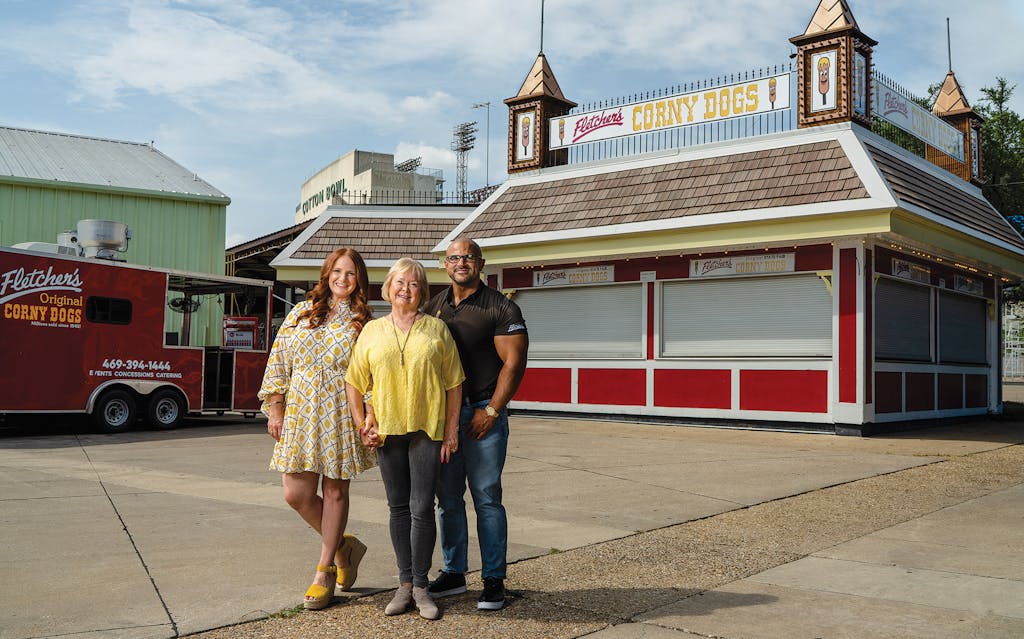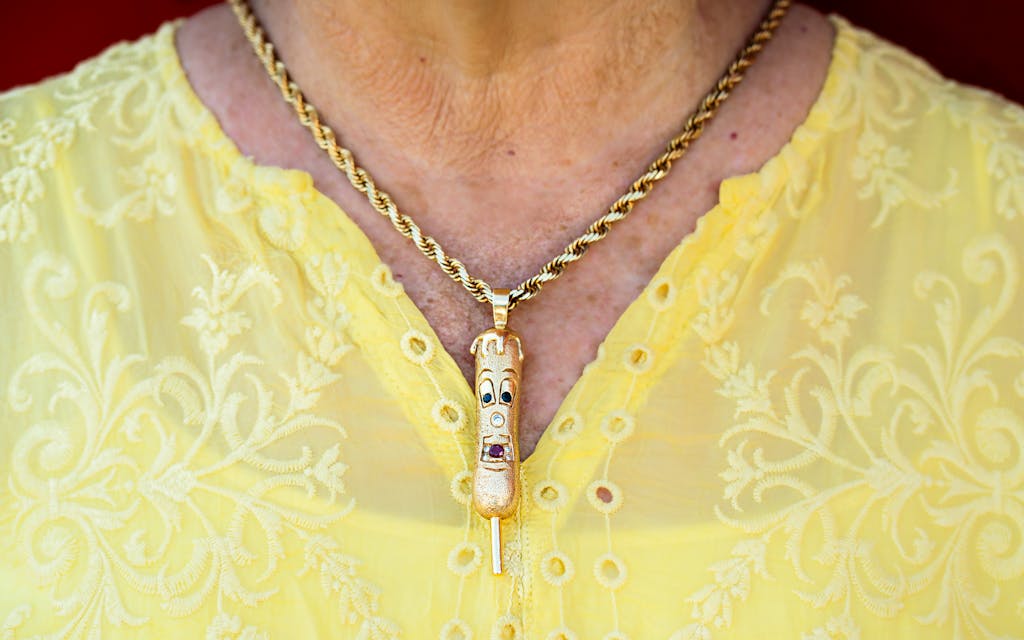Featured in the Dallas City Guide
Discover the best things to eat, drink, and do in Dallas with our expertly curated city guides. Explore the Dallas City Guide
Fanatics of Fletcher’s Original Corny Dogs are not subtle. They tattoo their forearms with the Fletcher’s logo, a smiling corny dog. They design their own Fletcher’s T-shirts. They crochet little Fletcher’s corny dogs for art projects. They use the Fletcher’s ketchup-and-mustard color scheme for elaborate ball gowns. They name their dogs Fletcher. They name their children Fletcher.
Like bees following the scent of flowers, on the day of the Texas Rangers’ home opener this past April fans drifted toward a red Fletcher’s food truck outside the seating area at Globe Life Field. The seduction of the corny dog—never, among Fletcher’s devotees, a “corn dog”—was primal, awakening nostalgia for a taste of childhood, of the state fair, of sunny days cooling into fall.
It’s the meat, contended a woman accompanied by three children in matching blue T-shirts. “It doesn’t taste like a cheap hot dog.”
“It’s the breading,” said a stocky redheaded man who guessed he’d had “a hundred” corny dogs in his life. “It’s all about the batter.”
“It’s classic,” said a woman with long, curly hair, poised to take a bite of her corny dog. “It’s evenly crisp. And that curlicue on top”—where the batter collects at the tip—“it’s my fave.”
For almost eight decades, corny dog lovers have kept the Fletchers’ family-run business sizzling. Each year at the state fair, it sells more than half a million corny dogs from seven concession trailers staffed by a multigenerational platoon of Fletchers.
Bearing the Fletcher surname within a hundred-mile radius of Dallas’s Fair Park brings with it a certain amount of celebrity. It means that when you introduce yourself on a call with the electric company, the representative asks excitedly, “You’re a Fletcher with the corn dog family?!”

For Glenda Gale “G. G.” Fletcher, who became the majority owner of the company following her husband Skip’s death in 2017, it also means protecting that name and the simple promise it carries: that of a perfect corny dog.
I met 72-year-old G.G. at her home in Double Oak, a Metroplex suburb north of Flower Mound, on a sunny day last April. She wore a floral blouse and light-yellow slacks that matched her blond bob. She sat on a leather couch in the middle of her home office. Next to her was Amber, G.G. and Skip’s 34-year-old daughter. Amber is in charge of Fletcher’s marketing and events (her brother Aaron also operates in a leadership role), and she makes a point of wearing red and yellow for business occasions. “I now have more clothing items in those two colors than I can count,” she said. That day, she wore a mustard-yellow knee-length dress, her bright red hair falling in waves down her back.
The women were surrounded by photographs, news clippings, and treasured memorabilia that added a museum-like quality to the room: a Mr. Corny mascot costume, bobbleheads, T-shirts, signage from days of yore. Lording over it all was a life-size cardboard cutout of Skip wearing a crown and a red robe and holding a two-foot-long corny dog–shaped scepter. He had a kindly expression on his face, like that of a saint about to dispense a blessing.
The family certainly could have used his wisdom in recent years. Not only did the state fair, their main source of income, shutter during the pandemic, but a lawsuit exposed a great chasm within the family. G.G. felt responsible for protecting the company’s fabled history—one she was happy to regale me with on my visit.
“They were rounders,” she said of the company’s founders, Skip’s father, Neil Fletcher Sr., and uncle Carl Fletcher. “They were all vaudevillians.”
As G.G. guided me through the photo albums and newspaper clippings, she explained that Neil and Carl were sixth-generation showmen. They acted in traveling tent performances with their family as part of a group called the Madcap Players. In 1938 the brothers were performing at Fair Park when state fair officials approached them about renting a booth. “We said, ‘Sure,’ ” Neil told a Dallas Morning News reporter in 1978. “Then, over a bottle of bourbon, we tried to figure out what we could sell there.”
Neil remembered a baker’s creation he’d once tried in Oak Lawn: a hot dog embedded in cornmeal shaped like an ear of corn. It tasted decent but was difficult to eat with a knife and fork. The brothers wondered if they couldn’t just impale the meat on a stick, batter it, and fry it. It would be portable. It would be perfect for the fair.
The research and development process that followed rivaled the Manhattan Project in intensity. Carl and Neil worked to perfect a corn-based coating that both tasted good and adhered to the weenie. Then they monitored the battered dog as it fried so it didn’t acquire what they called a “yellow belly”—a mark of undercooking.

Corny dogs made their state fair debut in 1942. Neil and Carl lured passersby to the booth with their showmen’s charm and free small bites. By the end of their first fair, the brothers had made $8,000 (about $134,000 today).
The golden age of deep-fried concessions, which would bring fairgoers fried Jell-O and fried bubble gum, was still years in the future. But the era of the pioneer, the corny dog, had begun.
After Neil and Carl died, the empire passed to the next generation, and in 1988 Skip became the majority owner. He was a crooner who idolized Frank Sinatra. “The pastor would get up at church while he was singing and go, ‘Okay, ladies, this is church. We can’t be having any swooning out there,’ ” G.G. recalled. He was also a theatrical storyteller. He once explained a scar on his leg to Amber by saying he’d been “shot by a jealous husband.”
When he wasn’t running the business, Skip worked as a commercial airline pilot. In time, he charmed a 31-year-old flight attendant, a single mother from Mineola who would become his fifth wife and be with him for the next 39 years: G.G.
Like everyone in the family, G.G. worked the fair during its 24-day run each fall. For the first few years, she was a cashier. “I was bottom of the seniority list, for sure,” she said. That changed in time, especially after Skip retired from Frontier Airlines in 1982. He and G.G. decided to open brick-and-mortar Fletcher’s franchises. At their peak, in the eighties, the family owned 52 Fletcher’s locations, some as far away as Arizona.
Then came the oil bust of 1986, which ruined businesses across the state. In 1990, after unsuccessful attempts at downsizing, the company filed for bankruptcy. A bankruptcy trustee sold the trademark and name to State Fair Foods. G.G. and Skip were devastated. They could lease the Fletcher’s name on the fairgrounds (and at one Dallas golf tournament), but they could not, without permission, operate beyond those borders under their own name.
Still, the company—and the family—got along fine. For the next few decades, Fletcher’s did good business during the fair, in late September and early October, and avoided scandal—until a few years after Skip died, when an intra-family squabble threatened the company’s good name.

Skip’s passing was difficult for everyone in the family, even those who weren’t at the forefront of the corny dog business, such as G.G.’s step-granddaughter, Jace Fletcher, now Jace Christensen. An energetic blonde with an inventive spirit, Jace, who went by “Fletch,” felt close to “Papa Skip.” She’d never missed a birthday or a Christmas with him. After he died, she began wearing a bracelet she had given him for his eightieth birthday, calling it her good luck charm.
Jace had been interested in the restaurant business in college, but having read that most restaurants fail within their first few years, she decided to take a different path. She moved to New York City to work as a research analyst for a high-yield debt firm; then she worked in real estate in Miami.
But in August 2016, she moved back to the Dallas area with her husband, a commercial real estate agent, and their one-year-old twins, during a respite from her career. Since she wasn’t working when Skip died, five months later, she was able to help G.G. sort out the family’s affairs, including the funeral arrangements. She prepared remarks for a eulogy.
Standing before the crowd at Skip’s funeral, she had an epiphany. “As I was looking out into the audience of three hundred fifty people, I felt so overwhelmed with community, and I felt at peace, and I felt my feet were grounded,” she later said, “and at some point, I knew I was going to be involved with my family’s business.”
But that was not to be. What happened next became the subject of a long, ugly legal fight, with headlines in the Dallas Morning News alluding to a “civil war.” Family members declined to discuss the case on the record, but according to court documents, Jace was surprised to learn that she was not in Skip’s will, and in early 2019, she decided to launch her own company along with her mom, Victoria “Vic” Warner Fletcher.
She planned to sell not “corny dogs,” she said, but rather “artisanal corn-battered franks.” She would name the company “Fletch.” Jace and Vic began by selling at concession stands and catering to provide late-night snacks for weddings, kids’ birthday parties, and corporate events. At first Fletch operated without incident—until the women held a media luncheon in late February 2019.
G.G. received a text from a public relations representative with the state fair congratulating her on the new Fletcher’s Original Corny Dogs venture. She told the representative, “I don’t know what you are talking about.”
In early March 2019 Jace arranged a sort of peace summit with G.G. at Black Walnut Cafe in Flower Mound. In court, Jace did not recall the lunch being tense. “Please don’t let me find out about anything again publicly like this,” Jace remembered G.G. telling her, and Jace promised G.G. that any announcements would go through her first. It was as close to a truce as they would achieve.
Six days later, Jace told G.G. she was planning to open a brick-and-mortar restaurant.


A gauntlet, it seems, had been thrown. G.G. acted quickly. In May of 2019, she had finally reacquired ownership of the Fletcher’s trademark. Soon thereafter, a lawyer for Fletcher’s Original Corny Dogs sent Jace a cease and desist letter asking her to change Fletch’s name. It was confusing customers, the letter said. By then, the mother-and-daughter team had sunk $1 million into their operation, and there were contracts under the name “Fletch” that they didn’t feel they could break. Beyond the financial concerns, Jace felt the legal action was unfair. After all, she kept saying, it was her name.
In September 2019, Fletcher’s Original Corny Dogs filed a trademark infringement lawsuit against Fletch. The press, meanwhile, continued to have a field day with the story. Jace told WFAA, a local ABC affiliate, that she was shocked by the lawsuit. She referred to the family name in a few interviews as “the f-word.”
At the injunction hearing, both sides spent hours arguing existential questions of nomenclature. When asked about Jace’s nickname, G.G. testified that her granddaughter was not called Fletch but, rather, “Jacey-Poo . . . that’s the only nickname I’m aware of.” Jace was adamant that she never used the words “corn dog” or “corny dog” in her marketing, but G.G.’s attorney presented evidence of the words being used in hashtags on Fletch’s social media. At one point he turned to Jace and asked pointedly, “So you sell corn dogs, right?”
“Artisanal corn-battered franks, sir,” Jace corrected him.
The judge ordered Jace and Vic to temporarily refrain from using the name “Fletch” until the case could be taken to a jury. Meanwhile, the two women forged ahead, opening their flagship Dallas restaurant in January 2020 under the provisional handle “CornDog with No Name” (the grand opening had been delayed from September 2019 because of the lawsuit). Ultimately, the two sides of the family reached a confidential settlement, and Jace decided the No Name moniker would become permanent.
Recently, I met Jace at CornDog with No Name. She introduced me to Cornelia, her twelve-day-old newborn, and took me on a tour of the restaurant, where a black-and-white painting of Jace, decked out in 1800s gambler attire and holding a bouquet of corn dogs, overlooks the cocktail bar. She presented me with a platter of offerings including the Brunch, a hickory-smoked sausage dipped in funnel-cake batter, rolled in bacon bits, fried, and drizzled with maple syrup.
Gregarious and enthusiastic, Jace talked about the Corn Dog Queen, a 24-karat-gold-dipped corn dog that comes with sparkling white wine; the tenacity it took to perfect a bacon-rolled corn dog; the corn dog beer CornDog with No Name serves with mustard on the rim, upon the recommendation of the brewery that makes it; and her plans for a lobster corn dog, among other unusual offerings. “Whatever happened happened, and that’s okay,” Jace said of the family feud. “There’s plenty of appetite for corn dogs.”
The other Fletchers have moved on too. They struggled to stay profitable during the pandemic. With the fair closed, the family turned to pop-ups: by the end of 2020, they had hosted more than a hundred events. This May, they announced a partnership with the Golden Chick restaurant chain; in July, they revealed yet another partnership, with the online food company Goldbelly, which ships their corny dogs across the country.
As G.G. edges toward retirement, Amber and her brother Aaron are considering ways to expand, now that they’re free to grow under their own corny dog crest: Should they sell the batter mix? Should they retail frozen corny dogs at grocery stores? If they begin setting up brick-and-mortar restaurants again, how will they maintain their strong association with the fair?
In late September, the state fair will once again open its doors to the public. The hair-dryer-hot winds of summer will abate, and Texans will sense a crackling in the air—perhaps from a deep fryer, miles in the distance. Their thoughts will drift once again to corny dogs. These thoughts will bring with them a wistfulness uncomplicated by trademark disputes and family feuds. Texans will gaze upon their children and grandchildren—Fletcher, Fletcher Jr., and Fletcher III—and nod, knowing that it is time to return.
This article originally appeared in the October 2021 issue of Texas Monthly with the headline “Sticking Power.” Subscribe today.
- More About:
- Flower Mound
- Dallas









